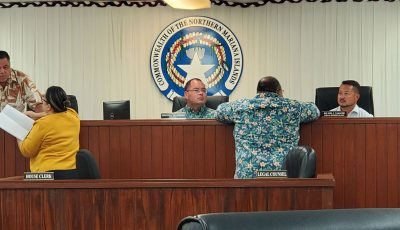A commitment to business, family, community succeeding as one
Editor’s Note: This is the transcript of Staffler’s Chamber of Commerce forum speech and she asked that it be printed here since the event was canceled.
The Saipan Chamber of Commerce recently asked the candidates for lieutenant governor and other positions to comment on the very broad subject of “business legislation and community benefits.” Although the Chamber unfortunately canceled its public forum with the candidates to discuss this topic, I would still like to share with our community the platform and plans that Tina Sablan and I have, that I would have discussed in that forum.
Being data-driven is an important value to Tina and me. Data helps us understand the big picture and make sound decisions. For example, we know from the 2020 census data that about 72% of civilians in the CNMI are employed in the private sector. Approximately 26% are employed by the government. Moreover, only 2.3% consider themselves self-employed.
Tina and I believe that small businesses and a strong, competitive workforce are the heart of a healthy economy, and that the government serves an important role in ensuring a level playing field and supporting the success of both small businesses and workers. Our vision resonates with the Chamber’s vision of islands “where business, family, and community succeed as one.”
Economies all over the world are still reeling from the effects of the pandemic, and we are no exception to that in the Marianas. Tina and I understand that our islands will only move forward through enterprise. Enterprise means business, of course, but it also refers to undertakings that are challenging and require great effort. Reinvigorating our economy will take enterprise in every sense of that word.
We also know that when something is hard, working collaboratively can drive innovation and creative solutions. We must be change agents to actively support 100% of our workforce, in both the public and private sectors. This is key to a healthy economy, and what the people of the CNMI can expect from Tina and me.
Tina and I believe in modernizing our government and making it more accessible and responsive to the needs of the business community —from expediting the transition to e-government, to expanding policies in the area of e-commerce.
E-commerce is one of many ways to diversify our economy. Think of all the Instagram stores that have “popped up” in the last couple of years, and all the teens meeting up in parking lots engaging in commerce—and not for illicit drugs! They’re trading in fast fashion and accessories! This is the new start-up entrepreneurship of this generation, and our government has been slow to act to support innovation like this in our business community. In some ways, the current administration has actively worked against economic growth, particularly in e-commerce.
In 2021, I authored House Bill 22-55, to establish a separate license for online sales of alcoholic beverages. This bill would have been a revenue generating bill, allowing e-commerce businesses that are based in the CNMI to apply for a liquor license. I introduced this legislation after learning about the dilemma faced by e-commerce entrepreneurs in the CNMI who are unable to get liquor licenses. One CNMI resident who sells gift baskets online shared with me that she wanted to legally include wine as part of her package options, but could not do so because the CNMI’s liquor license laws didn’t recognize online businesses. Here she was, trying to expand her business, but unable to do so because of bureaucracy.
H.B. 22-55 passed both the House and the Senate, with the support of the Department of Commerce. Unfortunately, it was vetoed by Gov. Torres. This is but one of many examples of how this administration stymies economic growth and negatively affects small businesses.
Tina and I hosted a series of listening sessions with small business owners over the past several months, and one recurring theme we heard had to do with lengthy and inefficient government processes for permitting and licenses. One CNMI business owner shared with us that in the states, he is able to renew his business license online in under 30 minutes. Here in the CNMI, he said, “My renewals have taken upwards of three months.” Another small restaurant operator told us that in the states, he was able to complete his food handler’s training and testing entirely online, and to print his food handler’s certificate at home within minutes of passing the test. He was shocked to return home to the CNMI to find that online certification wasn’t even an option, and getting his food handler’s certificate took many days.
It was from these meetings and these stories that Tina and I decided we would create a Small Business Advisory Council as a way to stay abreast of policies and issues affecting the business community, so we can be responsive, especially in this rapidly changing world.
In addition to modernizing our government, Tina and I believe building a strong workforce is a key part of the Sablan-Staffler economic development plan. Our 2020 census data shows that only 11% of the CNMI employed population are in the construction industry. In the U.S., it is 20%, almost twice that of the CNMI. Although there are huge plans for development in the CNMI, from rebuilding the Northern Marianas College, to the CDBG-DR housing program and FEMA home construction, our workforce in the construction industry is still woefully underdeveloped.
Tina and I envision all educational and workforce agencies and institutions collaborating to create career pathways for people to develop the skills they need for productive and gainful employment, especially in the construction trades. In fact, this initiative has already begun. I have authored H.B. 22-115, to require all contractors to be licensed in the CNMI, and H.B. 22-118, to establish an apprenticeship program within the CNMI. Both bills are the product of a collaborative effort with the Northern Marianas Technical Institute, Northern Marianas College, Public School System, Department of Labor, Revenue and Taxation, and the Chamber of Commerce. Recently, NMC conducted a survey with the Chamber and reported that the lack of tax incentives for employers are a major hindrance for buy-in and participation in an apprenticeship program. Another concern is how to fund apprenticeships, especially in the construction trades.
House bills 22-115 and 22-118 complement each other. Currently, there is no contractor licensing law in the CNMI. H.B. 22-15 would require contractor licensing, and ensure that contractors in the CNMI have a licensed Managing Responsible Employee and access to certifications for their skilled trades employees. This legislation is necessary to protect both contractors and customers, providing consumer protections as well as accountability for all development in the CNMI. This legislation is also revenue-generating, and the funds collected will be used to support construction industry apprenticeships that will be part of the apprenticeship program that H.B. 22-118 will create.
H.B.22-115 and H. B.22-118 help provide a critical transition to prepare for the year 2029, when the Commonwealth-Only Contract Worker (CW) program will cease by law. These bills are examples of policies that align our Department of Labor with our educational institutions, especially in the essential area of the trades and workforce development. These bills benefit our community and economy because they make investments in building capacity in our workforce. The bills are currently in the House JGO committee and open to review and feedback.
The Sablan-Staffler platform includes plans to implement the Marianas Jobs Now Initiative, which will match people with jobs in the public and private sector and with training, including apprenticeships. Another initiative in our platform is the Come Home Project. This is aimed to recruit local talent from the CNMI diaspora, living or studying abroad, to come home. This program will help match these former residents with job opportunities in the private and public sectors, and assist in their transition back to the islands.
One piece of legislation that is business-related and offers community benefits is H.B. 22-98, authored by Tina and co-sponsored by myself and others, which aims to gradually raise the minimum wage, and strengthen workers’ rights. This bill is pro-worker, and it is also pro-business in that it would help make the CNMI more competitive in our ability to attract workers. Just last year, neighboring Guam raised their minimum wage again to $9.25/hour, but the CNMI still lags far behind, at $7.25/hour, which hasn’t changed since 2017. H.B. 22-98 proposes incremental increases in the minimum wage, from $7.25/hour to $10/hour, over four years. This bill does not (I repeat: does not) jump the minimum wage from $7.25/hour to $10/hour outright.
H.B. 22-98 is also pro-business because it helps create a level playing field for employers, strengthening worker protections and stiffening penalties against bad actor employers who cheat workers out of wages and unfairly undercut competitors. Moreover, CNMI wage law has not changed since 1998, and badly needs an update. The current law is grossly outdated, with the CNMI minimum wage in our code still set at $3.05/hour. The current law also allows egregious and discriminatory practices such as paying senior citizens or people with disabilities less than the minimum wage. H.B. 22-98l is now in the House Ways and Means Committee and is open to feedback.
One of the biggest community benefits that working families got to experience this recent tax season was the Earned Income Tax Credit, which was paid out to the CNMI’s working families for the first time in 20 years. Implementation of the EITC was the result of collaboration with Delegate Gregorio Kilili Sablan, who included full and permanent federal funding for this tax credit in the American Rescue Plan Act, and Tina Sablan, who authored the legislation that became Public Law 22-03, to restore the EITC to the Commonwealth’s working families. Prior to P.L. 22-03, the CNMI government imposed a 100% tax on the EITC. The EITC is a proven and effective tool to fight poverty, encourage work, and lift household incomes by putting money back into the pockets of working individuals and families.
Another collaborative effort can be found in Delegate Kilili Sablan’s H.R. 560, which both Tina and I support. This bill would provide status and stability for CW workers, their families, and their employers. H.R. 560 is critical for both humanitarian and economic reasons. CW families are part of our community and must be part of the Commonwealth’s transition to 2029. The CNMI has a champion in Washington, D.C. with Congressman Kilili. The CNMI will also have champions in the governor’s office with Tina and me, and we will work with Kilili and the Biden administration to advocate for the CNMI’s workforce and economic needs.
Aligning our systems brings benefits for our whole community. To become islands “where business, family, and community succeed as one,” we truly have to work as one. Let us be change agents to move our community forward through enterprise, and bring to fruition this vision of a thriving economy, with healthy small businesses and a strong workforce at its center.
Leila C. Staffler (Special to the Saipan Tribune)
Rep. Leila C. Staffler is a Precinct 5 representative in the House of Representatives of the 22nd Legislature and chairs the Education and the Workforce Committee.



























